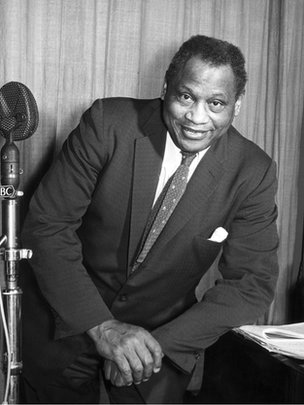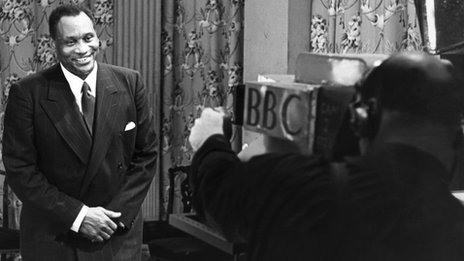![]()
6 May 2014
Singer Robeson’s granddaughter
recalls fight against racism
By Vincent DowdWitness programme, BBC World Service
Fifty six years ago, on 9 May 1958, the singer Paul Robeson gave a famous comeback concert at Carnegie Hall in New York.
One of the most popular singers of his era, Robeson had been placed on a list of Americans suspected of allegiance to Moscow and for years was barred from performing. Susan Robeson remembers him both as a grandfather and as a resolute campaigner for civil rights in America
As a teenager Susan Robeson spent a lot of time with her grandfather Paul. Her memories are keen and affectionate.
She’s a private and thoughtful person not always at ease with the glare of publicity. But since the death last month of her own father, Paul Robeson Jr, she is the family member left to tell the world about a unique and controversial figure in American culture.
“I grew up in the period when my grandfather had his passport revoked by the State Department in Washington. For eight years from 1950 he couldn’t travel so I got to know him better than I might have done. The US Government was obsessed with silencing him.
“President Truman even signed a specific executive order restricting my grandfather to the continental United States, so he couldn’t even go to Canada. It was repressive and absurd.”
Paul Robeson had been born in 1898 in Princeton, the son of a Presbyterian minister. At Rutgers university in New Jersey he showed both academic and athletic skill before going to study at Columbia in New York City. Though he trained for the law, as a young man his looks and superb bass voice pushed him toward a career in acting and singing.
As a singer he tackled everything from Broadway show tunes to folk songs to spirituals and parts of the classical repertoire.
But Susan Robeson says her grandfather always encountered racial prejudice, from childhood onwards.
“It went right through his college years and later when he was an artist trying to make his way. He grew up at the turn of the century when America was an apartheid society.
“In 1928 he was offered the chance to appear in the London premiere of the musical Show Boat.
He thought African Americans needed to understand the struggles around the world and connect with them.—Susan Robeson
“He felt there would be less prejudice there and he ended up staying for about a decade. London was where his film career emerged and he made a lot of recordings. So he did well financially but he knew that as an African American he was the exception who stood out.”
Susan Robeson says her grandfather’s political instinct also developed in Britain.
“He really emerged as someone who spoke out about independence for the colonial world. He linked the conditions of African Americans to colonised people all over the world. He saw it as one and the same struggle.
“It was something he was very outspoken about. And when he came back to the States at the beginning of the war he brought that global awareness with him. He thought African Americans needed to understand the struggles around the world and connect with them.”
‘Surprised’ by his recording
“He had a credo in the era when fascism was on the rise in Europe. He said the artist needed to elect to fight for freedom or for slavery. It was as simple as that.”
That credo involved aligning himself with communism in the US, though he denied ever becoming a party member.
Susan Robeson points out that the Communist Party was entirely legal.
“People now sometimes hear his recording of the Hymn of the Soviet Union and are surprised,” she says.
“But at the time America and the USSR were military allies. Without the USSR Hitler and his army would never have been defeated.”
What outraged some in America were Robeson’s reported comments at the Peace Congress held in Paris in April 1949.
Exactly what he said has been disputed. The gist as reported in the press was that black people in America shouldn’t see the Soviet Union as the enemy because a greater threat was bigotry at home.
Robeson, one of America’s best-known performers, was now firmly on the FBI list of Soviet fellow travellers. In 1950 his passport was cancelled. Susan Robeson says it was a severe burden for someone who made much of his living from touring abroad.
“When the passport was revoked the FBI came to retrieve it,” she says.
‘Virtual prisoner’
“He demanded to be told why so they put in a call to the State Department. He was told that when he travelled abroad he spoke out against colonialism and advocated for African independence. They said that was against the best interests of the United States.
“My grandfather was exercising his rights under the constitution and because of that he was made a virtual prisoner in his own country. Those so-called reasons for withdrawing his passport were unconstitutional.
He was told that if he would write… a letter promising to abstain from political statements he would get his career back. And my grandfather said no.—Susan Robeson
“From 1949 the FBI put pressure on concert halls not to allow him to sing. No recording company would issue a contract and he disappeared from the radio. Here was a man who’d been used to selling out the biggest theatres in the country and now only a few small venues would offer him work – generally black churches and community centres.
“At one point the US Secretary of State Dean Acheson offered him a deal. He was told that if he would write Acheson a letter promising to abstain from political statements he would get his career back. And my grandfather said no.”
Eventually in 1958 a case before the US Supreme Court (Kent v Dulles) established that the government had no right to withhold passports for reasons of party political allegiance. The previous year America’s red-baiter in chief, Senator Joe McCarthy, had died. Times were changing.
‘He’d fought and won’
A promoter managed to secure Robeson the Carnegie Hall date in May ’58. The live album put out on the Vanguard label is still available and the warmth of the audience response is obvious.
As a small child Susan Robeson attended the concert. “Obviously it was a memorable occasion. But I remember afterwards my grandfather saying the reaction of an audience wasn’t what he now craved.
“I’m sure he must have enjoyed all the applause but what meant most to him was that he’d fought and won. The attempt to silence him failed.”
About five years after the concert Paul Robeson more or less retired. There were those who would have liked him to take an active part in the civil rights movement of the 1960s but for the rest of his life his health was often poor. He died in 1976.
Bitterness comes from regret and my grandfather had no regrets ever.—Susan Robeson
Susan Robeson is proud that her grandfather helped lay the groundwork for the social changes of the 1960s.
“He was never bitter. Bitterness comes from regret and my grandfather had no regrets ever.
“What he was advocating was an early form of black power but he was doing it in the 1950s. He had the satisfaction of seeing the world change. A lot of the things he paid such a price for saying came to be accepted. I remember he told me his watch had always been running fast.”
>via: http://www.bbc.com/news/entertainment-arts-27291682



![Robeson [third from left] picketed in front of the White House in 1949 to "end discrimination at the Bureau of Engraving"](http://kalamu.com/neogriot/wp-content/uploads/2014/06/Paul-robeson-03.jpg)